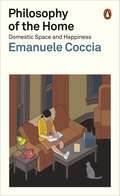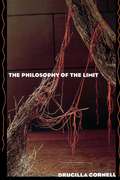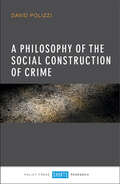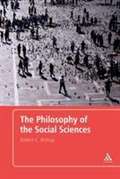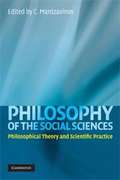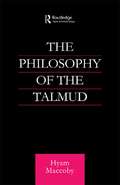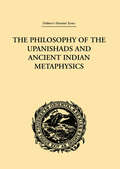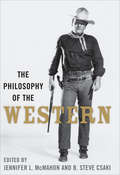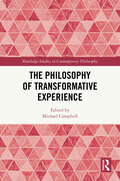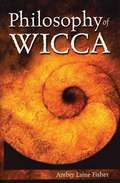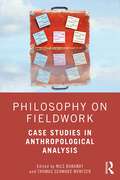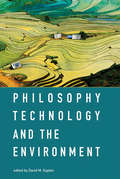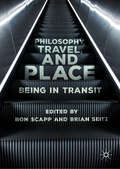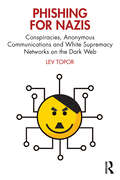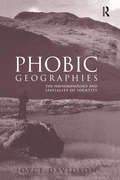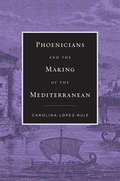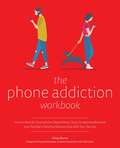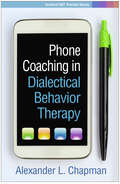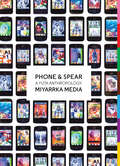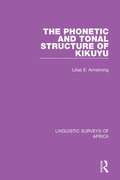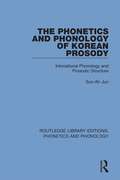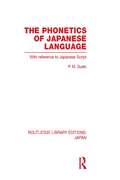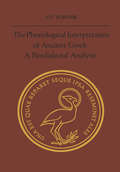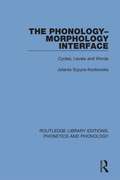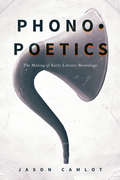- Table View
- List View
Philosophy of the Home: Domestic Space and Happiness
by Emanuele CocciaA bedroom, a kitchen, a bathroom - are these rooms all that make a home? Not at all, argues Emanuele Coccia. The buildings we inhabit are of immense psychological and cultural significance. They play a decisive role in human flourishing and, for hundreds of years, their walls and walkways, windows and doorways have guided our relationships with others and with ourselves. They reflect and reinforce social inequalities; they allow us to celebrate and cherish those we love. They are the places of return that allow us to venture out into the world.In this intimate, elegantly argued account, Coccia shows how the architecture of home has shaped, and continues to shape, our psyches and our societies, before then masterfully leading us towards a more creative, ecological way of dwelling in the world.
The Philosophy of the Limit
by Drucilla CornellIn The Philosophy of the Limit Drucilla Cornell examines the relationship of deconstruction to questions of ethics, justice and legal interpretation. She argues that renaming deconstruction "the philosophy of the limit" will allow us to be more precise about what deconstruction actually is philosophically and hence to articulate more clearly its significance for law. Cornell's focus on the importance of the limit and the centrality of the gender hierarchy allows her to offer a view of jurisprudence different from both the critical social theory and analytic jurisprudence.
A Philosophy of the Social Construction of Crime
by David PolizziIt is well known that the social definition of individuals and ethnic groups helps legitimize how they are addressed by law enforcement. The philosophy of the social construction of crime and criminal behaviour reflects how individuals, such as police officers, construct meaning from the perspective from which they emerge, which in turn influences their law enforcement outlook. In the field, this is generally viewed through a positivist frame of reference which fails to critically examine assumptions of approach and practice. Written by an international specialist in this area, this is the first book which attempts to situate the social construction of crime and criminal behaviour within the philosophical context of phenomenology and how these constructions help inform, and ultimately justify, the policies employed to address them. Challenging existing thinking, this is essential reading for academics and students interested in social theory and theories of criminology.
The Philosophy of the Social Sciences: An Introduction
by Robert BishopThe book not only offers lucid and incisive coverage of the philosophy of the social sciences, but also extends the major debates and considers the latest directions in this growing area of philosophical interest. Robert C. Bishop's cogent and rigorous analysis is supplemented by useful pedagogical features, including key examples from philosophical writing; summaries of core debates; sample questions and exercises; and guides for further reading.
Philosophy of the Social Sciences: Philosophical Theory and Scientific Practice
by C. MantzavinosThis volume is a unique contribution to the philosophy of the social sciences, presenting the results of cutting-edge philosophers' research alongside critical discussions by practicing social scientists. The book is motivated by the view that the philosophy of the social sciences cannot ignore the specific scientific practices according to which social scientific work is being conducted, and that it will be valuable only if it evolves in constant interaction with theoretical developments in the social sciences. With its unique format guaranteeing a genuine discussion between philosophers and social scientists, this thought-provoking volume extends the frontiers of the field. It will appeal to all scholars and students interested in the interplay between philosophy and the social sciences.
Philosophy of the Talmud (Routledge Jewish Studies Series)
by Hyam MaccobyThis is a new presentation of the philosophy of the Talmud. The Talmud is not a work of formal philosophy, but much of what it says is relevant to philosophical enquiry, including issues explored in contemporary debates. In particular, the Talmud has original ideas about the relation between universal ethics and the ethics of a particular community. This leads into a discussion on the relation between morality and ritual, and also about the epistemological role of tradition. The book explains the paradoxes of Talmudic Judaism as arising from a philosophy of revolution, stemming from Jewish origins as a band of escaped slaves, determined not to reproduce the slave-society of Egypt. From this arises a daring humanism, and an emphasis on justice in this world rather than on other-worldly spirituality. A strong emphasis on education and the cultivation of rationality also stems from this. Governing the discussion is a theory of logic that differs significantly from Greek logic. Talmudic logic is one of analogy, not classification and is peculiarly suited to discussions of moral and legal human situations. This book will be of interest to those in the fields of philosophy, religion and the history of ideas, whether students, teachers and academics, or the interested general reader.
The Philosophy of the Upanishads and Ancient Indian Metaphysics: As Exhibited In A Series Of Articles Contributed To The Calcutta Review (classic Reprint)
by Archibald Edward GoughFirst Published in 2000. Routledge is an imprint of Taylor & Francis, an informa company.
The Philosophy of the Western (The Philosophy of Popular Culture #Ppcs)
by Jennifer L. McMahon and B. Steve CsakiEssays about how stories of the Old West reflect—and affect—our beliefs and values.The solitude of the lone rider, the loyalty of his horse, and the unspoken code of the West—for many, Western movies embody America and its values, though the view of the country&’s history they present isn&’t always accurate. In recent years, scholars had declared the genre dead, but a steady resurgence of western themes in literature, film, and television has reestablished its importance and influence.In The Philosophy of the Western, editors Jennifer L. McMahon and B. Steve Csaki examine philosophical themes in the western genre. Investigating subjects of nature, ethics, identity, gender, environmentalism, and animal rights, the essays in this volume draw from a wide range of westerns including the more recent popular and critical successes Unforgiven, All the Pretty Horses, 3:10 to Yuma, and No Country for Old Men, as well as literature and television serials such as Deadwood. The Philosophy of the Western reveals the powerful role of the western in the American psyche.
The Philosophy of Transformative Experience (Routledge Studies in Contemporary Philosophy)
by Michael CampbellThis volume examines the nature and significance of transformative experiences as they occur across a variety of contexts in human life. By treating these events as social as well as individual phenomena, the essays bring to light the various ways in which cultural and institutional forces influence narratives of personal change. The ease with which we identify transformative experiences shows their importance for our sense of the potentialities inherent in human life, even while their disruptive character threatens confidence in our capability to make rational decisions concerning our future well-being. Yet, narratives of transformation are not just individual artefacts, but are also given support and structure through social forces including shared languages, practices, and institutions. What are the cultural and institutional contexts which enable this form of self-conceptualisation, and what happens when social changes undermine the cogency of these narratives? The chapters in this volume investigate these issues through a blend of philosophical theory and applied cases, working across the disciplinary boundaries of philosophy and social anthropology. Contributors investigate topics including recovery from trauma; the role of narratives in gender transition; climate activism; the ethical ramifications of war; the role of media in framing narratives of ethical change; and the university as a site of transformative experience. The Philosophy of Transformative Experience will be of interest to philosophers working in ethics, political philosophy, and decision theory, as well as scholars and advanced students in anthropology, sociology, and literary studies.
Philosophy of Wicca
by Amber Laine FisherThis book examines and analyzes the philosophy of Wicca, and among other things discusses how Wiccans can interact with mainstream religions. Other topics include why nature is important in Wicca, an examination of the Wiccan Rede and why balance is so important in the practice of Wicca.
Philosophy on Fieldwork: Case Studies in Anthropological Analysis
by Nils BubandtHow do we teach analysis in anthropology and other field-based sciences? How can we engage analytically and interrogatively with philosophical ideas and concepts in our fieldwork? And how can students learn to engage critical ideas from philosophy to better understand the worlds they study? Philosophy on Fieldwork provides "show-don’t-tell" answers to these questions. In twenty-six "master class" chapters, philosophy meets anthropological critique as leading anthropologists introduce the thinking of one foundational philosopher – from a variety of Western traditions and beyond – and apply this critically to an ethnographic case. Nils Bubandt, Thomas Schwarz Wentzer and the contributors to this volume reveal how the encounter between philosophy and fieldwork is fertile ground for analytical insight to emerge. Equally, the philosophical concepts employed are critically explored for their potential to be thought "otherwise" through their frictional encounter with the worlds in the field, allowing non-Western and non-elite life experience and ontologies to "speak back" to both anthropology and philosophy. This is a unique and concrete guidebook to social analysis. It answers the critical need for a "how-to" textbook in fieldwork-based analysis as each chapter demonstrates how the ideas of a specific philosopher can be interrogatively applied to a concrete analytical case study. The straightforward pedagogy of Philosophy on Fieldwork makes this an accessible volume and a must-read for both students and seasoned fieldworkers interested in exploring the contentious middle ground between philosophy and anthropology.
Philosophy, Technology, and the Environment (The\mit Press Ser.)
by David KaplanContributions by prominent scholars examining the intersections of environmental philosophy and philosophy of technology.Environmental philosophy and philosophy of technology have taken divergent paths despite their common interest in examining human modification of the natural world. Yet philosophers from each field have a lot to contribute to the other. Environmental issues inevitably involve technologies, and technologies inevitably have environmental impacts. In this book, prominent scholars from both fields illuminate the intersections of environmental philosophy and philosophy of technology, offering the beginnings of a rich new hybrid discourse. All the contributors share the intuition that technology and the environment overlap in ways that are relevant in both philosophical and practical terms. They consider such issues as the limits of technological interventions in the natural world, whether a concern for the environment can be designed into things, how consumerism relates us to artifacts and environments, and how food and animal agriculture raise questions about both culture and nature. They discuss, among other topics, the pessimism and dystopianism shared by environmentalists, environmental philosophers, and philosophers of technology; the ethics of geoengineering and climate change; the biological analogy at the heart of industrial ecology; green products and sustainable design; and agriculture as a bridge between technology and the environment.ContributorsBraden Allenby, Raymond Anthony, Philip Brey, J. Baird Callicott, Brett Clark, Wyatt Galusky, Ryan Gunderson, Benjamin Hale, Clare Heyward, Don Idhe, Mark Sagoff, Julian Savulescu, Paul B. Thompson, Ibo van de Poel, Zhang Wei, Kyle Powys Whyte
Philosophy, Travel, and Place: Being In Transit
by Ron Scapp Brian SeitzThis book continues the exploration of themes either neglected or devalued by others working in the field of philosophy and culture. The authors in this volume consider the domain of travel from the broadest and most diverse of philosophical perspectives, covering everyday topics ranging from commuting and vacation travel to immigration and forced relocation. Our time in transit, our being in transit, and our time at rest, whether by choice or edict, has always been at issue, always been at play (and has always been in motion, if you will), for our species. The essays collected here explore the possibilities of the material impact of being able to move or stay put, as well as being forced to go or prevented from leaving.
Phishing for Nazis: Conspiracies, Anonymous Communications and White Supremacy Networks on the Dark Web
by Lev ToporPhishing for Nazis is an evidence-based, undercover study of neo-Nazi communities on anonymous communication platforms that helps to shine a light on the dark web. It unveils how hatred and conspiracies spread and thrive online and how white supremacy is becoming prominent as extremists find shelter in the online dank underbelly of society. Phishing for Nazis explains how online manifestations of hate radicalize people into taking “real-world” action, such as shooting sprees. Methodologically, this book is unique, as it incorporates undercover cyberethnography, a method frequently used by law enforcement and intelligence agencies, unlike traditional academic studies of racism or social behavior that rely on secondary sources or surveys. With a particular interest on how race issues translate online, the book presents the true phenomenon of racism without relying on political correctness or whitewashing. It contributes to the field of cyber communication, as it details why and how people communicate and manage entire communities without knowing one another. The book also contributes to public policy, regulators, and technology companies as they deal with the practice of online anonymity and extremism.
Phobic Geographies: The Phenomenology and Spatiality of Identity
by Joyce DavidsonDespite recent estimates that there are currently 10 million people in the UK suffering from phobias, there is a substantial and conspicuous gap in existing academic literature and research on this topic. This book addresses this gap in relation to geography literature, but also extending beyond this field to connect with a wide range of academics, health professionals and phobic 'others' whose ideas are (re)formed by fear. In doing so, it provides non-clinical, specifically geographical insights into phobia, of relevance for its sufferers and expands human geographical understandings of the relations between gender, embodiment, space and mental health, via a study of agoraphobia. This book argues that a critical geographic perspective is better placed to take account of the importance of wider social contexts and relations, and can give a fully spatialised account of the disorder more faithful to the way sufferers actually describe their experiences. By drawing attention to some of the more unusual ways that people relate to each other, and to their environments, we can illuminate some ordinarily taken for granted aspects of personal geographies.
Phoenicians and the Making of the Mediterranean
by Carolina López-RuizThe first comprehensive history of the cultural impact of the Phoenicians, who knit together the ancient Mediterranean world long before the rise of the Greeks. Imagine you are a traveler sailing to the major cities around the Mediterranean in 750 BC. You would notice a remarkable similarity in the dress, alphabet, consumer goods, and gods from Gibraltar to Tyre. This was not the Greek world—it was the Phoenician. Based in Tyre, Sidon, Byblos, and other cities along the coast of present-day Lebanon, the Phoenicians spread out across the Mediterranean building posts, towns, and ports. Propelled by technological advancements of a kind unseen since the Neolithic revolution, Phoenicians knit together diverse Mediterranean societies, fostering a literate and sophisticated urban elite sharing common cultural, economic, and aesthetic modes. The Phoenician imprint on the Mediterranean lasted nearly a thousand years, beginning in the Early Iron Age. Following the trail of the Phoenicians from the Levant to the Atlantic coast of Iberia, Carolina López-Ruiz offers the first comprehensive study of the cultural exchange that transformed the Mediterranean in the eighth and seventh centuries BC. Greeks, Etruscans, Sardinians, Iberians, and others adopted a Levantine-inflected way of life, as they aspired to emulate Near Eastern civilizations. López-Ruiz explores these many inheritances, from sphinxes and hieratic statues to ivories, metalwork, volute capitals, inscriptions, and Ashtart iconography. Meticulously documented and boldly argued, Phoenicians and the Making of the Mediterranean revises the Hellenocentric model of the ancient world and restores from obscurity the true role of Near Eastern societies in the history of early civilizations.
The Phone Addiction Workbook: How to Identify Smartphone Dependency, Stop Compulsive Behavior and Develop a Healthy Relationship with Your Devices
by Hilda BurkeStop scrolling and start living! Build healthier relationships between you, your smartphone and all your devices, including tips to reduce social media obsession, notification anxiety and other unhealthy habits.Your smartphone is a powerful device that has fundamentally changed your life—no doubt improving it in many ways. And while you don’t need to give up your smartphone completely, if your day to day is filled with endless, anxiety-inducing checking, swiping and liking, then you need this helpful, step-by-step workbook to take back control of your life.Phone addiction is similar to gambling addiction and substance abuse. Its consequences include stress, depression, insomnia, intimacy issues and more. Written by an experienced psychotherapist, couples therapist and former telecommunications industry insider, The Phone Addiction Workbook’s program offers the blueprint for understanding addictive behavior and how it controls you. Weekly charts, practical tips and interactive activities help you stop unhealthy behavior and make lasting change.
Phone Coaching in Dialectical Behavior Therapy (Guilford DBT® Practice Series)
by Alexander L. ChapmanThis is the first comprehensive guide to phone coaching in dialectical behavior therapy (DBT)--an integral part of treatment that many clinicians find challenging. What are the principles and goals of phone coaching? What limits should be set? How can a therapist manage suicide risk during a brief call? DBT expert Alexander Chapman addresses these and other critical practical questions in this accessible book. He provides guidelines for coaching core DBT distress tolerance and emotion regulation skills; coaching "dos and don'ts"; and tips for structuring each call's beginning, middle, and end. Featuring many concrete examples, strategies, and model dialogues, the book includes a key chapter on suicide crisis calls.
Phone & Spear: A Yuta Anthropology
by Miyarrka MediaA visually striking intercultural exploration of the use of mobile phones in Aboriginal communities in Australia. Yuta is the Yolngu word for new. Phone & Spear: A Yuta Anthropology is a project inspired by the gloriously cheeky and deeply meaningful audiovisual media made with and circulated by mobile phones by an extended Aboriginal family in northern Australia. Building on a ten-year collaboration by the community-based arts collective Miyarrka Media, the project is an experiment in the anthropology of co-creation. It is a multivoiced portrait of an Indigenous society using mobile phones inventively to affirm connections to kin and country amid the difficult and often devastating circumstances of contemporary remote Aboriginal life.But this is not simply a book about Aboriginal art, mobile phones, and social renewal. If old anthropology understood its task as revealing one world to another, yuta anthropology is concerned with bringing different worlds into relationship. Following Yolngu social aesthetics—or what Miyarrka Media translate as “the law of feeling”—the book is a relational technology in its own right: an object that combines color, pattern, and story to bring once distant worlds into new sensuously mediated connections.
The Phonetic and Tonal Structure of Kikuyu (Linguistic Surveys of Africa #21)
by Lilias A. ArmstrongOriginally published in 1940, this book was the result of 3 years' worth of phonetic research and analysis with the aim of laying foudnations for improved methods of teaching and ascertaining the most scientific basis for current orthography of the Kikuyu language of Kenya.
The Phonetics and Phonology of Korean Prosody: Intonational Phonology and Prosodic Structure (Routledge Library Editions: Phonetics and Phonology #12)
by Sun-Ah JunFirst published in 1996. This book examines the phonetics and phonology of Korean prosody. Based on phonetic experiments, it proposes intonationally marked prosodic constituents above the word which condition various connected speech phenomena. This title will be of interest to students of language and linguistics.
The Phonetics of Japanese Language: With Reference to Japanese Script (Routledge Library Editions: Japan)
by P M SuskiThis book gives true characters of Japanese speech sounds in reference to European speech sounds. When it was first published in 1931, it was the first book of its kind. There are only 5 Japanese vowel elements as opposed to 18 in English, 13 in French and 8 in German. There are 15 Japanese consonants, 26 in English, 22 in French & 23 in German. Because of the lesser number of elements, it follows that the wider range in vowels and consonants is heard by Japanese ears, so this volume gives average sounds uttered by Japanese in the twentieth century in relation to the English sounds.
Phonological Interpretation of Ancient Greek, The: A Pandialectal Analysis
by Vit BubenikThis volume treats systematically the variation found in the successive stages of the development of all ancient Greek dialects. It combines synchronic approach, in which generative rules expound phonological divergencies between the systems of different dialects, with a diachronic statement of unproductive and mostly pan-Hellenic shifts.Professor Bubeník presents a phonetic description and structural phonemic analysis of the best-known variant--Classical Attic of the 5th century B.C.--and displays and contrasts the vocalic and consonantal inventories of all the other dialects classified according to their major groups. Derivational histories of individual dialects are examined in their juxtaposition, to ascertain which rules are shared by various dialects and which are dialect-specific. The pandialectal framework enables Bubeník to capture various relationships among genetically related dialects which are missed in atomistic and static treatments, and to show more convincingly the extent of their similarity and their systemic cohesion.This volume makes a significant contribution to both classical scholarship and current theory of language change by offering new analyses of a variety of phonological and morphophonemic problems presented by a dead language and its dialects.
The Phonology-Morphology Interface: Cycles, Levels and Words (Routledge Library Editions: Phonetics and Phonology #22)
by Jolanta Szpyra-KozłowskaFirst published in 1989. The development of morphological and phonological theory within the broad framework of generative grammar poses a number of important questions concerning the mutual relationship of phonology and morphology. This study aims to answer these questions. On the basis of Polish and English language material, the author examines the most important aspects of phonology-morphology interaction, and suggests the best model with which to describe these phenomena.
Phonopoetics: The Making of Early Literary Recordings
by Jason CamlotPhonopoetics tells the neglected story of early "talking records" and their significance for literature, from the 1877 invention of the phonograph to some of the first recorded performances of modernist works. The book challenges assumptions of much contemporary criticism by taking the recorded, oral performance as its primary object of analysis and by exploring the historically specific convergences between audio recording technologies, media formats, generic forms, and the institutions and practices surrounding the literary. Opening with an argument that the earliest spoken recordings were a mediated extension of Victorian reading and elocutionary culture, Jason Camlot explains the literary significance of these pre-tape era voice artifacts by analyzing early promotional fantasies about the phonograph as a new kind of speaker and detailing initiatives to deploy it as a pedagogical tool to heighten literary experience. Through historically-grounded interpretations of Dickens impersonators to recitations of Tennyson to T.S. Eliot's experimental readings of "The Waste Land" and of a great variety of voices and media in between, this first critical history of the earliest literary sound recordings offers an unusual perspective on the transition from the Victorian to modern periods and sheds new light on our own digitally mediated relationship to the past.
